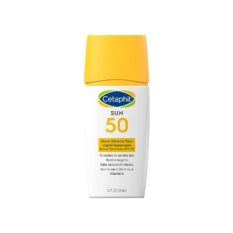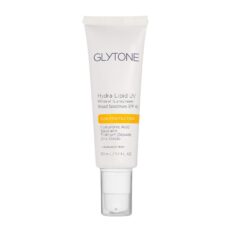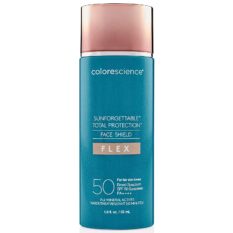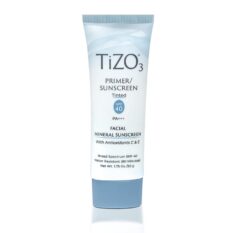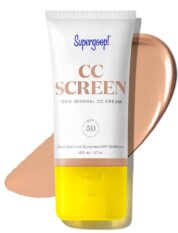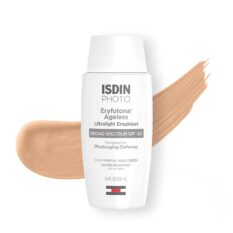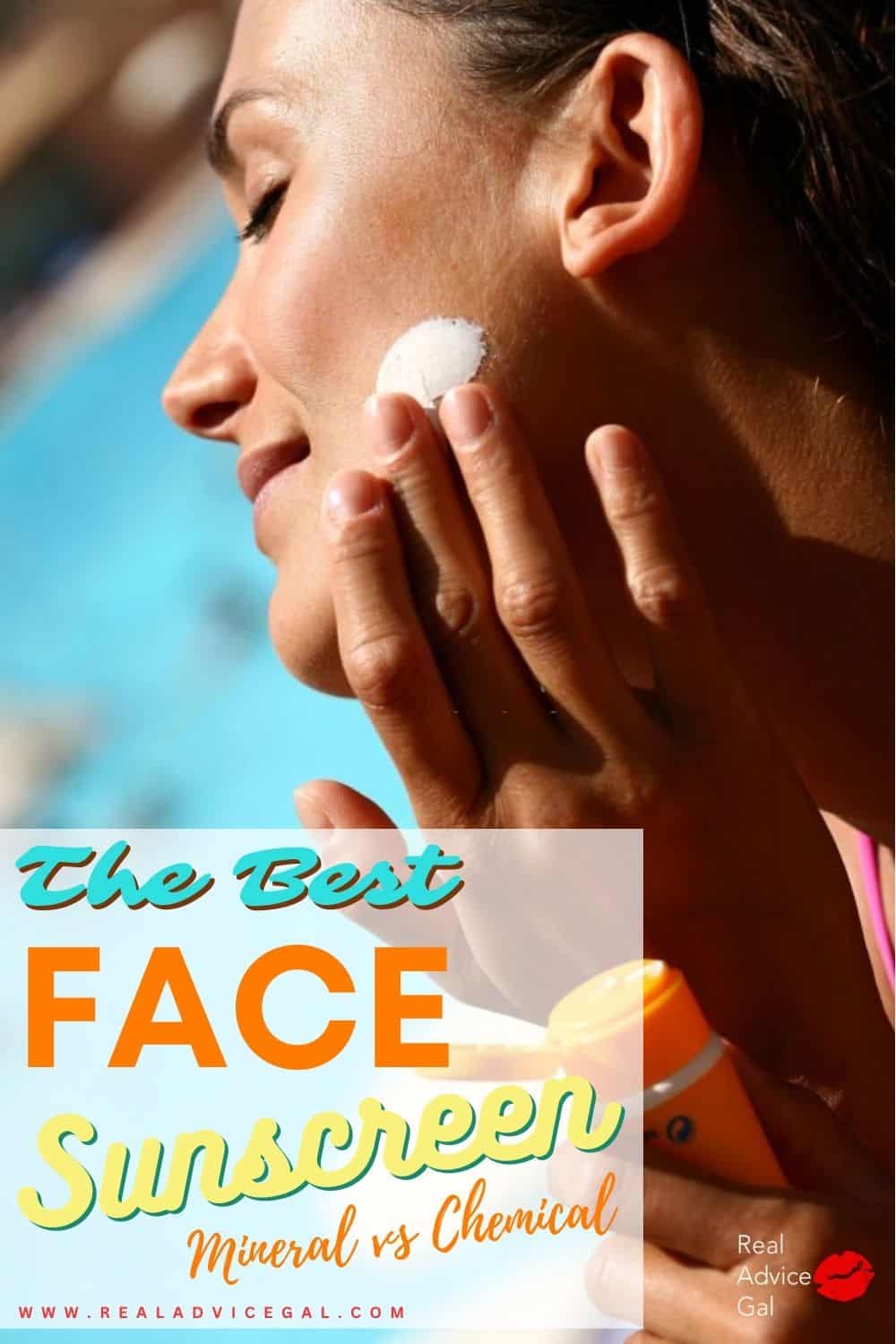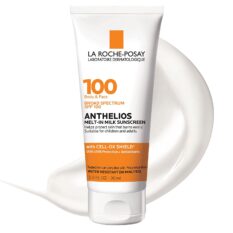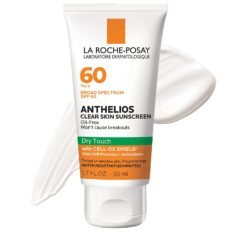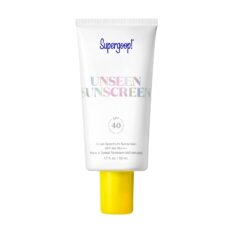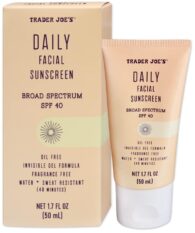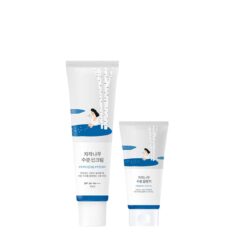Physical vs Chemical Sunscreen – Which is Better?
Sunscreen is an essential part of any skincare routine, especially when it comes to protecting your skin from the harmful effects of the sun. Everyone should know how to apply sunscreen properly to fully take advantage of its protection. In this article, let’s talk about physical vs chemical sunscreen.
Which type of sunscreen is best?
Here’s the short answer. It’s up to your needs and what your skin tolerates.
Physical sunscreen protects by sitting on top of the skin and reflecting the UV rays. Chemical sunscreen absorbs UV rays and converts it into heat and release them from the body.
With the sun’s rays becoming more intense due to the depletion of the ozone layer, it has become even more important to protect your skin from the sun’s damaging UV rays, so the best sunscreen is the one you will use daily whether that’s physical sunscreen or chemical sunscreen.

It wasn’t that long ago that I was little. Well, yes it was. There is something I remember from my teenage years that has stuck with me for a lifetime. I had a girlfriend who I hung out with all the time. We did everything together and whenever I saw her father he would shake my hand.
In my hand, he would leave a gift. The gift was something that I didn’t understand the value or the worth at the time, but 24 years later I fully understand. You see in, my hand he would give me a tiny sample of sunscreen. He was, of course, a dermatologist. He told me to use it always and use it often. I never forgot that lesson.
If you fast forward to my life now, you would see on my bathroom counter sits different types of sunscreen. You would think sunscreen doesn’t make much of a difference, but you would be wrong. I am originally from Florida and when I went to my high school reunion it was evident as to who used sunscreen regularly and who didn’t. I also try to wear a hat and sit in the sun.
I want to make sure my children also develop the same habits I have for applying sunscreen. They also have broad spectrum sunscreens on their counter. They are old enough to apply it to their faces, legs, and arms. They often help one another. It is so important to be aware of the dangers surrounding not applying sunscreen. In my state of Virginia, melanoma rates have risen 35% in the last ten years. That is just awful and preventable. On average 350 American are diagnosed with skin cancer every hour.
That is why it is so important to show your children how to apply sunscreen and to model applying sunscreen yourself. I have sunscreen in the door of all of my cars. The kids know if we are going outside they need sunscreen. It doesn’t matter where we are; we always need one. I told them it is the shield like a superhero wears.
How to Apply Sunscreen
Not many people do not know how to properly apply sunscreen to their skin, which can lead to inadequate protection. In this article, we will go through the proper steps on how to apply sunscreen and how to make sure you are getting the best protection possible.
Step 1: Choose the right sunscreen
It’s important to choose the right suncreen for your skin. Look for a sunscreen that has a high SPF (sun protection factor) rating. This indicates how well the sunscreen protects against UVB rays.
The American Academy of Dermatology recommends using a sunscreen with an SPF of 30 or higher.
Additionally, look for a sunscreen that is labeled “broad-spectrum.” This protects you against both UVA and UVB rays. UVA rays penetrate deep into the skin and are responsible for premature aging, while UVB rays are responsible for sunburns.
You should also know about Physical vs Chemical Sunscreen and we will talk about that later in this article.
Step 2: Check the expiration date on the sunscreen.
Sunscreen does have an expiration date. Make sure to double check the label before using it. Expired sunscreen may not provide adequate protection.
Step 3: Apply sunscreen before going outside
It’s important to apply sunscreen at least 15 minutes before you go outside to allow time for the sunscreen to fully absorb into your skin. This will ensure that you have adequate protection from the sun’s harmful rays. If you wait until you are already outside, your skin will be exposed to the sun’s rays before the sunscreen can fully take effect.
Step 4: Use enough sunscreen
Many people do not use enough sunscreen, which can lead to inadequate protection.
Long-term exposure to UV rays causes pigmentation, redness, and aging.
The American Academy of Dermatology recommends using approximately 1 ounce (about a shot glass full) of sunscreen for each application. This is enough to cover your entire body. If you are using a spray sunscreen, be sure to hold the can close to your skin and apply in a continuous motion to ensure even coverage.
For the face, the two-finger method is the easiest way for you to measure how much sunscreen you need to apply to your face.
With this method, simply squeeze the sunscreen in two separate lines on your two fingers. This is enough to cover you whole face neck and ears.
Step 5: Apply sunscreen to all exposed skin
When applying sunscreen, be sure to apply it to all exposed skin, including your face, ears, neck, arms, and legs. Don’t forget areas that are often overlooked, such as the tops of your feet, the back of your neck, and your scalp (if you have thinning hair or a bald spot).
If you are wearing a swimsuit, be sure to apply sunscreen to areas that are not covered by the swimsuit.
Step 6: Reapply sunscreen every two hours
Sunscreen should be reapplied every two hours, or more frequently if you are swimming or sweating. Even if your sunscreen is labeled as “water-resistant,” it’s still important to reapply after swimming or sweating to ensure that you are getting the best protection possible.
Step 7: Use sunscreen every day
Even if you are not planning on spending a lot of time outside, it’s important to use sunscreen every day. The sun’s rays can still penetrate through windows, so you can still be exposed to harmful UV rays even if you are inside. Additionally, UV rays can be reflected off of surfaces like water, sand, and snow, which can increase your exposure to the sun’s rays.
Did you know that sunscreen is also an anti-aging product? A study shows that regular sunscreen use protects against photoaging which includes wrinkling, spotting, and loss of skin elasticity.
Step 8: Use additional protection
In addition to using sunscreen, it’s important to take other measures to protect your skin from the sun.
Wear protective clothing, such as long-sleeved shirts, pants, and hats.
Seek shade whenever possible, especially during peak sun hours especially from 10 a.m.-2 p.m..
I still believe that sunscreen after clothes is the most important thing I put on. It isn’t just for the summer, and it isn’t just for the pool. It should be part of your everyday routine, and every time you go outside. It is said that even 1 or 2 bad sunburns double your child’s risk to have skin cancer. Why take the chance? Have the Talk.
Now let’s talk about Physical vs Chemical Sunscreen
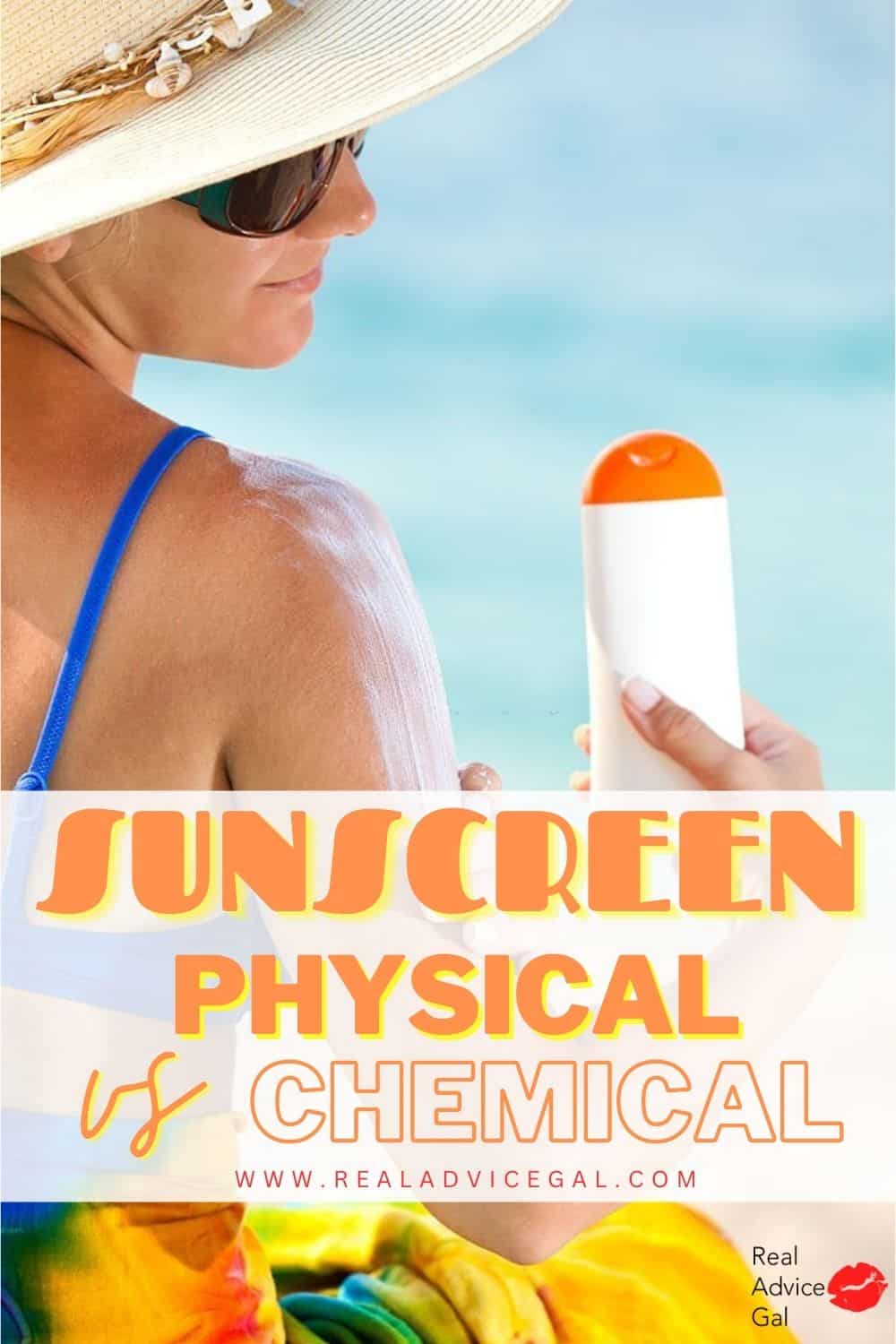
Physical Sunscreen vs Chemical Sunscreen
When it comes to sun protection it is crucial to understand the difference between physical and chemical sunscreens to choose the right product for your skin type and lifestyle.
Sunscreens work by either physically blocking or chemically absorbing ultraviolet (UV) radiation from the sun.
In this article, we will discuss the difference between physical and chemical sunscreens, how they work, and which one is better for your skin.
Which Sunscreen is Better Chemical or Physical?
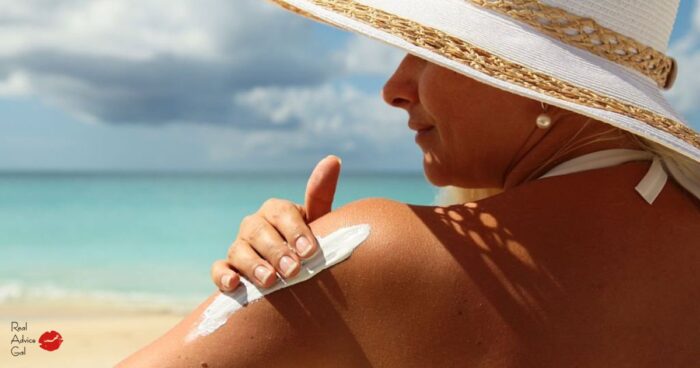
Physical Sunscreen (Mineral Sunscreen)
Physical sunscreen, also known also as mineral sunscreen, contains active ingredients such as zinc oxide and titanium dioxide that physically block UV rays from penetrating the skin.
These ingredients form a physical barrier on the skin’s surface, reflecting and scattering the UV radiation.
Mineral sunscreen is often preferred by people with sensitive skin or those who are allergic to chemical sunscreens.
What are the Advantages of Mineral Sunscreen/Physical Sunscreen?
1. Physical sunscreen starts working immediately after application. There is no need to wait for the sunscreen to absorb into the skin before going outside.
2. Physical sunscreens are also less likely to cause skin irritation. This is an excellent choice for those with sensitive skin. If you easily get irritated with sunscreen around your eyes, then mineral sunscreen is for you.
3. Research has shown that physical sunscreens provide excellent protection against both UVA and UVB radiation. And they even come in tinted options which provide additional coverage and are great for people with hyperpigmentation.
What are the Disadvantages of Mineral Sunscreen?
1. Most mineral sunscreen leaves white cast.
2. Physical sunscreen are often with thick consistency that sits on top of the skin and may cause breakouts to people with acne-prone skin.
The Best Face Sunscreens
THE BEST PHYSICAL SUNSCREENS / BEST MINERAL SUNSCREENS
La Roche-Posay Anthelios Mineral Ultra-Light Face Sunscreen SPF 50
- La Roche Posay makes a lot of good sunscreen and this mineral sunscreen is one of the best. It’s light on the face yet provides good coverage
- Non-greasy or oily looking and a good base if you wear makeup because of its matte finish
- Whitecast is very minimal
- Highly recommended by a lot of dermatologists for sensitive skin
- Zinc oxide and titanium dioxide sunscreen combines antioxidants to protect skin from free radicals.
- Comes also in tinted version
Cetaphil Sheer 100% Mineral Liquid Sunscreen With Zinc Oxide SPF 50
- An affordable mineral sunscreen option that’s also reef safe
- Nourishes sensitive skin.
- Hydrating so it’s great for dry skin.
- Chemical free sun protection that glides on the skin.
- It leaves a slight white cast
- Water resistant for up to 80 minutes
Glytone Hydra Lipid UV Mineral Sunscreen – Broad Spectrum SPF 40+
- Non-whitening; non-greasy SPF
- Made with hyluaronic acid, and squalane so it’s hydrating and great for dry skin
- Leaves white cast, so if you have darker skin tone this might not be a good choice for you
Vanicream Sunscreen Broad Spectrum SPF 50+
- If you have sensitive skin you should check out this mineral sunscreen that’s gentle and lightweight
- Absorbs quickly and easy to spread
- Provides broad spectrum protection using non-nano zinc oxide.
- It is water resistant (80 minutes)
- Non-comedogenic and dermatologist tested.
- Dye-free
- Fragrance-free
- Lanolin-free
- Paraben-free
- Formaldehyde Releaser Free
- Gluten-free
- Leaves some white cast
EltaMD UV AOX Elements Tinted Mineral Face Sunscreen Lotion
- This is one of the best tinted mineral sunscreen that I’ve tried. It’s lightweight, non-greasy and has matte finish
- It’s a moisturizing mineral sunscreen with hyaluronic acid, making it great for those with dry and combination skin
- Water-resistant up to 40 minutes
- Active ingredients are Zinc oxide, Titanium dioxide
- This color corrects and evens tone
Colorescience Total Protection Face Shield Flex SPF 50
- An all mineral sunscreen with extra benefits such as nourishing, hydrating and with advanced antioxidants for that healthy glowy skin.
- This is my current favorite mineral sunscreen. It’s not cheap but so worth it.
- 40-minute sweat/water resistance
- Iron-oxide pigments start white & adapt to your skintone for buildable coverage. Demi-matte finish.
- Available in 4 shades
- If you have mature skin, you will fell in love with this sunscreen. This is your secret for that no-makeup look
TiZO3 Facial Mineral Sunscreen and Primer, Tinted Broad Spectrum SPF 40 with Antioxidants
- If you want a sunscreen that works great under makeup then this is it! It’s a primer sunscreen with tint that will even out your skin tone
- Lightweight with silky matte finish.
- Good for oily skin. Not so for those with dry skin because it will make your skin matte all throughout the day.
- Sheer, tinted facial mineral sunscreen providing broad spectrum UVA and UVB protection.
- FREE of chemical sunscreen filters
- No dyes, no fragrances, no oils and preservatives
- Reef-friendly
- Water Resistant 80 Minutes
Supergoop! CC Screen – SPF 50 PA++++
- Super clean, oil-free, 100% mineral color-corrector cream that uses non-nano SPF protection
- Broad spectrum zinc oxide SPF 50 face sunscreen helps protect against UVA & UVB rays
- Nourishing and brightening
- The best thing is that this sunscreen is available in 15 different shades so you can find one that matches your skin tone.
ISDIN Eryfotona Ageless Sunscreen Zinc Oxide and 100% Mineral Tinted Sunscreen SPF 50+
- A favorite of dermatologists for its photoaging defense
- This sunscreen doesn’t just protect you from the sun but it also repairs your sun damaged skin and even corrects skin with moisturizing benefits
- A 100% mineral-based, tinted and water-resistant facial sunscreen with SPF 50, vitamin E antioxidant, 10.7% zinc oxide, peptide complex, and DNA Repairsomes.
- This blends easily and provide natural, lightweight coverage, non-greasy finish.
- Water-resistant up to 40 minutes in water, or while sweating.
- Good for all skin types and is non-comedogenic.
- Highly recommended for those with sensitive skin and for anti-aging
Chemical Sunscreen
Chemical sunscreen, on the other hand, contains active ingredients such as avobenzone, octinoxate, and oxybenzone that absorb UV radiation and convert it into heat energy, which is then released from the skin.
What are the Advantages of Chemical Sunscreen?
1. Chemical sunscreens are often lightweight, easy-to-apply and blends seamlessly into the skin which makes them more cosmetically elegant. If you want good sunscreen under makeup then chemical sunscreen is your choice.
2. It provides a higher level of sun protection than physical sunscreen. According to a study published in the Journal of the American Academy of Dermatology, chemical sunscreen with 3% avobenzone, 10% homosalate, 10% octisalate, and 5% oxybenzone provides an SPF of 50, which is higher than the SPF provided by physical sunscreen.
3. If you want to get the best of both worlds, they now make hybrid sunscreens that has mineral and chemical filters to provide enhanced protection against both UVA and UVB rays.
What are the Disadvantages of Chemical Sunscreen?
1. Chemical sunscreen may not be suitable for people with sensitive skin or those who are allergic to the active ingredients.
If you often experience redness or prone to skin irritation with chemical sunscreen, then make sure to check the ingredients and avoid those with Oxybenzone/ Benzophenone-3 (BP-3) which causes photoallergy.
2. Chemical sunscreen can also take up to 30 minutes to absorb into the skin before it starts working, which can be a disadvantage for those who need immediate protection from the sun.
3. Chemical sunscreen has also been found to be potentially harmful to coral reefs and other marine life.
THE BEST CHEMICAL SUNSCREENS
La Roche-Posay Anthelios Melt-in Milk Body & Face Sunscreen Lotion Broad Spectrum SPF 100
- If you have skin that’s prone to sunburn then this high SPF sunscreen is for you.
- I love this sunscreen lotion because it leaves my skin hydrated & smooth all throughout the day. It does not leave white cast so you can wear it under makeup.
- It melts in the skin and is absorbed quickly so it’s not greasy nut gives a healthy shine.
- Formulated with Cell-Ox Shield technology which means it provides broad spectrum UVA/UVB protection with antioxidants.
- Oxybenzone Free.
- Octinoxate Free
- For sensitive skin. Recommended by dermatologists not only for adults but for kids too
- Also comes in SPF 60 variant
La Roche-Posay Anthelios Clear Skin Dry Touch Sunscreen SPF 60
- Oil Free Face Sunscreen for Acne Prone Skin
- Great for oily skin. This helps absorb excess oil, reduce shine and won’t cause breakouts
- Absorbs quickly into the skin
- Lightweight and gives skin dry but with nice texture. Make sure to spread evenly
- Gives a slight white cast
Supergoop! Unseen Sunscreen – SPF 40
- This list is not complete without everyone’s favorite, the Supergoop! sunscreen
- One of the best. This is really lightweight and very smooth. A lotion like texture that’s moisturing and does not have white cast.
- Invisible, weightless, scentless formula that provides oil-free sunscreen protection for all skin types
- It protects and corrects. An antioxidant-rich face sunscreen helps filter blue light (skin-damaging light emitted from your phone, computer, & tablet), UVA, UVB & IRA rays.
- Doubles as primer. It glides to the skin and providing shine control & leaving a velvety finish
- Oxybenzone- & octinoxate-free everyday sunscreen that’s reef-friendly
- They also have a glowy version
Trader Joe’s Daily Facial Sunscreen Broad Spectrum SPF 40
- A dupe to the famous Supergoop! sunscreen at almost half the price
- A lot of people went crazy with this sunscreen and hoarded when they found out that it’s a close dupe of the popular Supergoop!
- Active ingredients are Avobenzone 3%, Homosalate 12%, Octisalate 5%, Octocrylene 6%
- If you can get it at a Trader Joe’s store near you it’s much cheaper but a lot of people said that it’s always out of stock
- Clear, non-greasy and no white cast
- It spreads easily and skin absorbs it easily
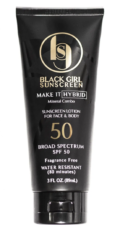
Black Girl Sunscreen Make It Hybrid™ SPF 50 Sunscreen
- If you have dark skin you will love this!
- Lightweight and feels great on the skin. It doesn’t leave white cast and moisturizes your skin
- A hybrid formula. It’s made with mixed lightweight mineral and synthetic formula with zinc-oxide is designed to protect against sun damage leaving no white residue and a dewy finish.
- Active ingredients are Homosalate: 10% Octisalate: 5% Octocrylene: 5% and Zinc Oxide: 5%
- Infused with ingredients such as aloe, lavender, shea butter, avocado oil, jojoba oil and more
Neutrogena Clear Face Oil-Free Sunscreen Broad Spectrum SPF 50
- Made for acne-prone skin. This is Oil-Free, Fragrance-Free & Non-Comedogenic
- Perfect for the face and body
- Sunscreen lotion that has a water-light texture
- Weightless, matte finish that lets skin breathe
- Active ingredient avobenzone, it provides superior UVA/UVB protection.
- Water-resistant for up to 80 minutes.
SkinMedica Total Defense + Repair SPF 34 Sunscreen Tinted
- If you want a sunscreen that also repairs your skin then this is it.
- A sunscreen and anti-aging skincare with ultra-sheer tint (light to medium skin tones)
- Protect skin from harmful infrared rays (IR-A rays).
- Reduce the appearance of lines and wrinkles.
- Suitable for all skin types
- Spreads easily and non-greasy
- Only downside is that it’s quite pricey
DRMTLGY Tinted Moisturizer with SPF 46
- All-in-one sunscreen that provides sheer color coverage and no white cast
- Lightweight and non-greasy formula that claims to improve skin’s hydration and texture over time.
- Broad Spectrum SPF 46 that protects against harmful UVA and UVB rays.
- Cruelty free and suitable for most skin types
- Tint is super sheer so it will suit all skin tones
- Lightweight, non-greasy and feels good on the skin
- Unfortunately, this has fragrance so if you’re sensitive to scented skin care then skip this
EltaMD UV Clear SPF 46 Tinted Face Sunscreen
- I love this sunscreen. It’s pricey but totally worth it especially if you have rosacea. I use this when I go out and I know that I will be exposed to the sun a lot and it calms my skin and prevents sun burn.
- Helps soothe sensitive skin types prone to acne, rosacea, and hyperpigmentation
- Lightweight and clear, so it doesn’t have white cast
- Active ingredients: Zinc oxide, Octinoxate
- Calms, protects sensitive skin
- With hyaluronic acid that hydrates skin and reduce the appearance of fine lines and wrinkles
ISNTREE Hyaluronic Acid Watery Sun Gel SPF 50+, PA++++
- My favorite! If you haven’t tried Korean sunscreens then you’re missing out. This is so refreshing on the skin and glides so smoothly with lotion like consistency.
- Moisturizing sunscreen like moisturizer
- No white cast, no fragrance
- Suitable for all skin types but if you have oily skin you may find it a bit shiny at the end of the day
- Very comfortable on the face. A great every day sunscreen.
- Not water resistant though
Beauty of Joseon Daily Relief Sunscreen with Broad Spectrum SPF 40
- Another beautifully made Korean sunscreen. I’m almost done with my first tube and I love it!
- This is another lightweight sunscreen that spreads nicely. You actually don’t feel anything with it on.
- It’s non-greasy and with lotion like consistency.
- An organic sunscreen that applies gently on the skin
- With skin calming ingredients
- SPF50+ PA++++ broad specturm approved by separate labs in South Korea and Spain.
- Rice Extract 30% which is a favorite ingredient of Koreans because it beautifies the skin
- Not water-resistant
Bondi Sands Sunny Cream SPF 60 Face Lotion
- If you will spend time at the beach this is a great sunscreen to protect your skin.
- No white cast and leaves skin dewy, so it’s better for those with dry skin
- Formulated with Aloe Vera and Vitamin E.
- Dermatologically Tested. Suitable for sensitive skin.
- Paraben + Sulfate Free.
- Providing UVA & UVB protection
- Fragrance Free Daily Face Lotion
- 72 hour hydration. Water resistant up to 80 minutes.
- Reef-friendly. It does not have oxybenzone and octinoxate
- Also check out, Bondi Sands Sunny Cream SPF 60 Body Lotion
ROUND LAB Birch Juice Moisturizing Sunscreen SPF50+ PA++++
- A Korean bestseller
- This is the favorite sunscreen in South Korea right now
- A moistuizer sunscreen which includes amino acids, minerals and Vita Hyaluronic Acid in the Birch Sap, which help supply rich moisture to the skin while blocking UV rays.
- Cool and refreshing to the skin. No white cast and easy to apply
Which one is better for your skin? Physical vs Chemical Sunscreen
The choice between physical vs chemical sunscreen depends on your skin type, lifestyle, and personal preferences. Physical sunscreen is a good option for those with sensitive skin or those who are allergic to chemical sunscreens. It provides immediate protection from the sun and is less likely to cause skin irritation.
Chemical sunscreen, on the other hand, provides a higher level of sun protection and is often preferred by people who want a lightweight, easy-to-apply sunscreen that blends seamlessly into the skin. It’s good choice for people with acne-prone or oily skin. However, it may not be suitable for people with sensitive skin or those who are allergic to the active ingredients.
Sun protection is an essential part of maintaining healthy skin, so be sure to choose the right sunscreen for your skin type and lifestyle. The most IMPORTANT thing is to use your sunscreen DAILY!
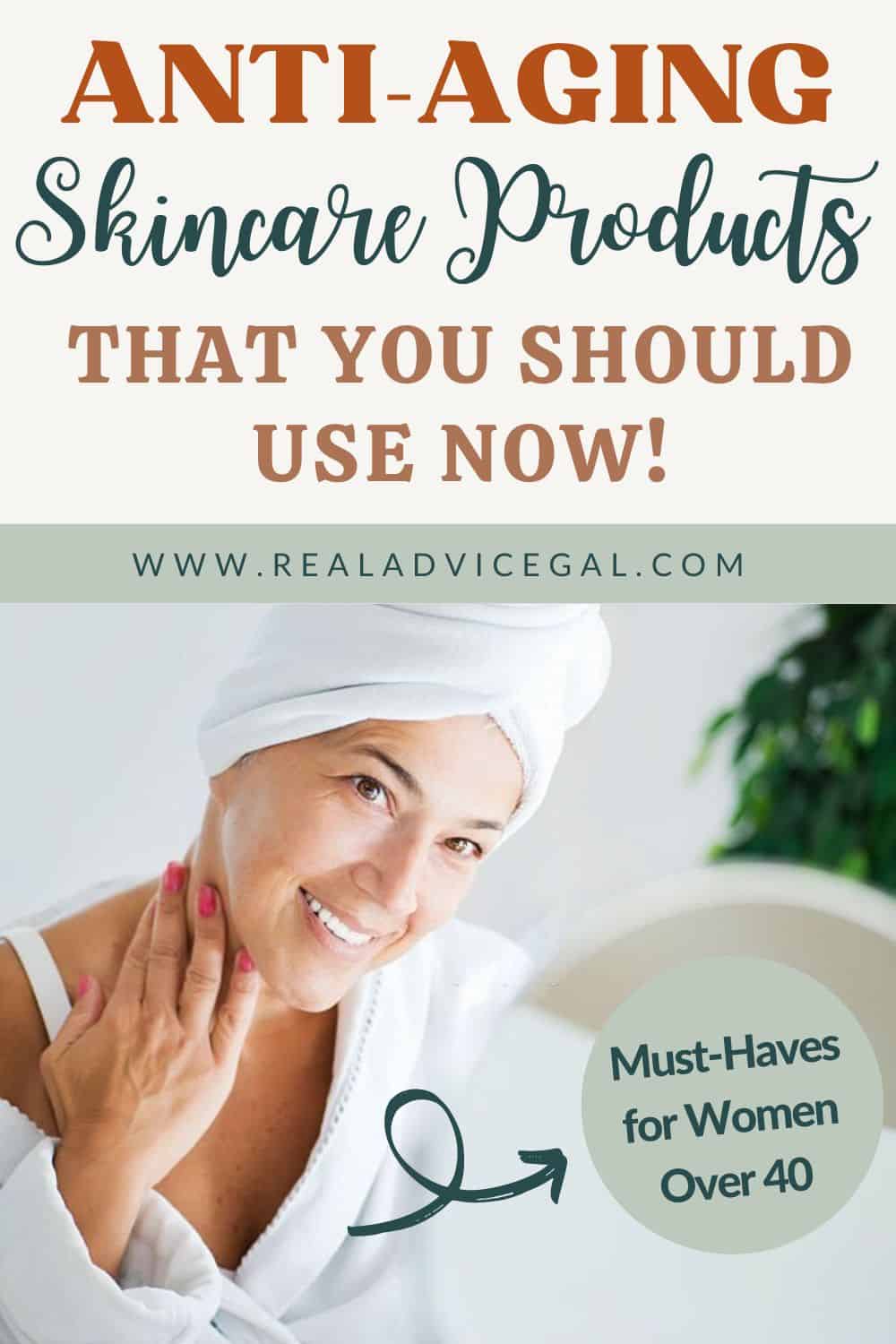
My Top 5 Best Anti Aging Skin Care Products for 40s
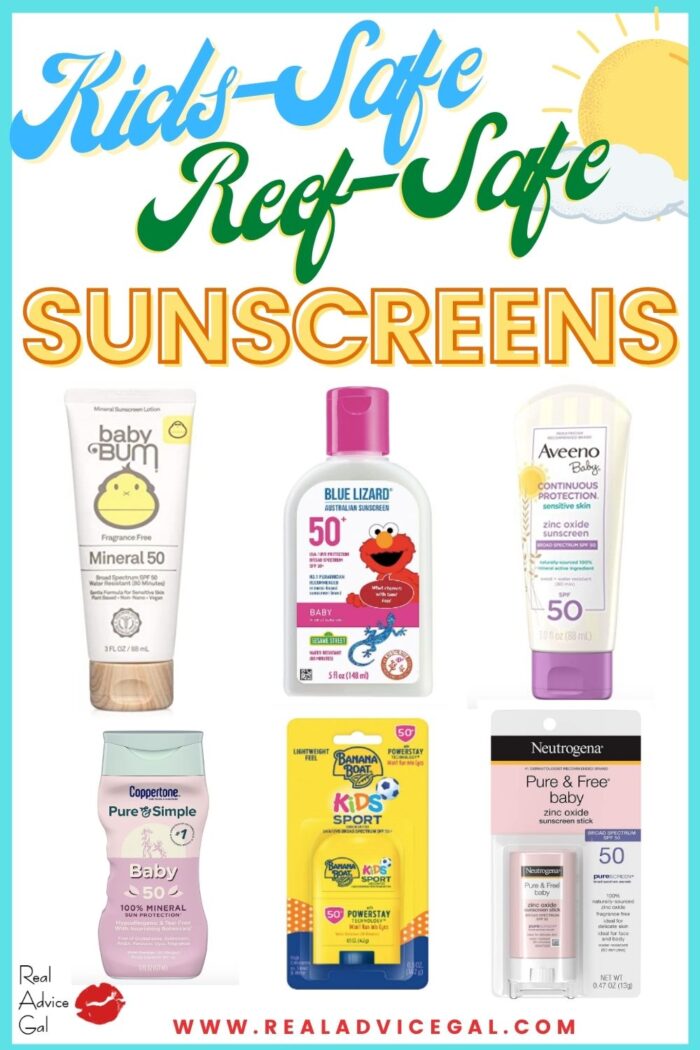
Best Kid’s-Safe Reef-Safe Sunscreens
FREE “I’m Bored” Fun Jar for Kids – 85+ Kids Activities
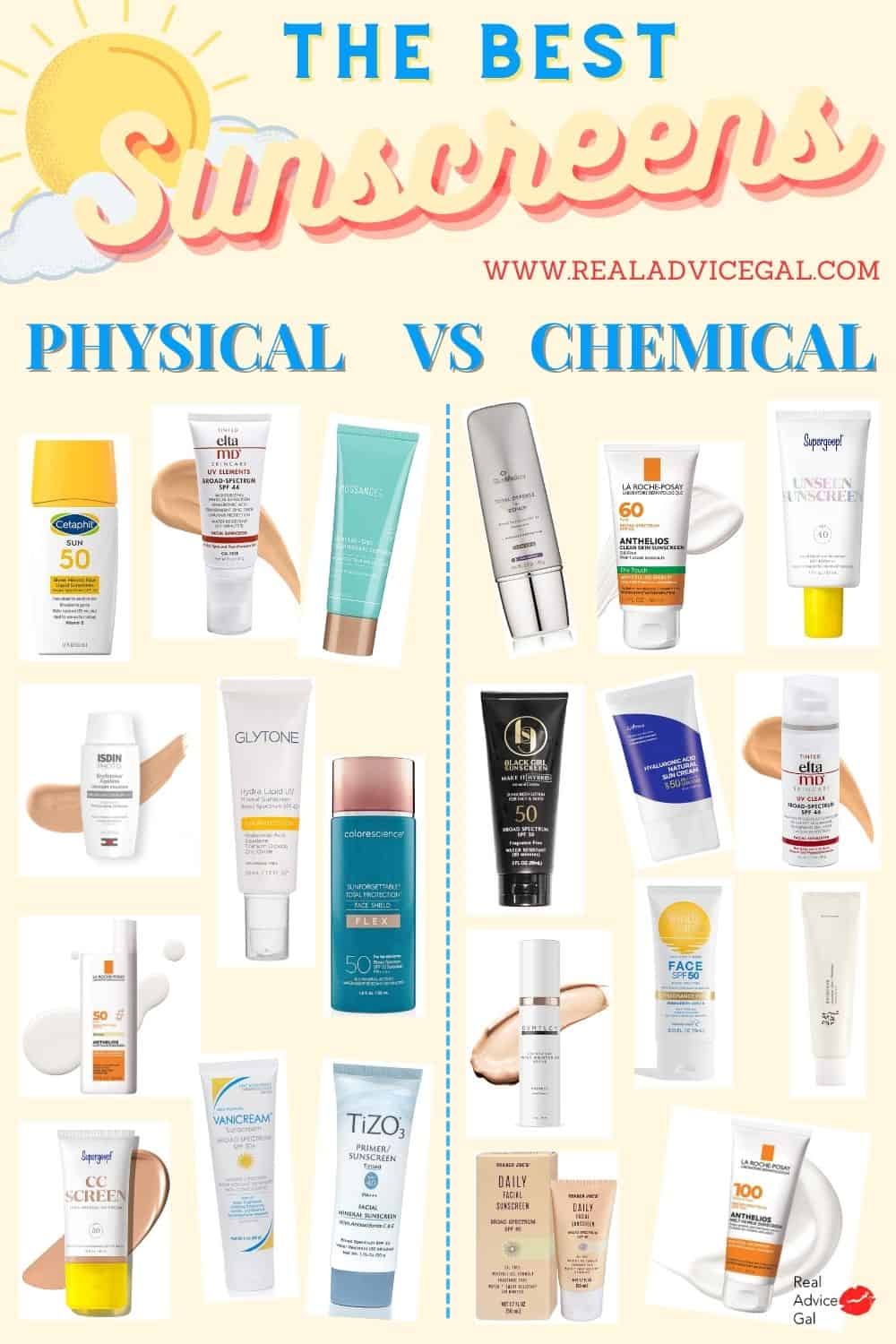
Disclosure: “As an Amazon Associate I earn from qualifying purchases.”
Meet Net, a skincare enthusiast and creative writer! With a passion for all things skincare, she is always eager to explore and learn about the latest trends and innovations in the industry. When not writing or indulging in their skincare routine, Net enjoys binge-watching TV series, knitting, and trading, among other hobbies. She is always eager to take on new challenges and try new things. Get ready to be inspired and learn something new with Net!







